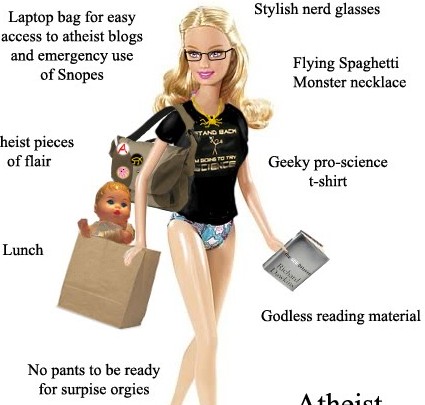Breaking News: Organized Secularism Different for Women

Main Image Credit: Classic Blag Hag
The American Secular Census is something I had seen but in which I had not participated before today because I am mostly interested in seeing the results without someone as (ahem) loud as I am skewing it in any possible way. Many of us here at Skepchick felt the same and did not join.
As it turns out, we didn’t need to participate for the data to corroborate the utterly shocking conclusion that being a secular American is very different for women than it is for men, especially when it comes to participating in organized secularism.
The “where the ladies at?” question is sometimes answered with a dismissive “it’s a guy thing” response. The notion that there are far fewer skeptical and/or atheistic women than there are such men is taken to be canon among many involved in said movements. According to the data, while there are more men than women (about 58% vs. 42%), the gap isn’t big enough to easily explain the disparity in leadership that, while closing, is still an issue.
Women outnumber men in terms of having participated in the secular movement and then leaving. Related to their lack of participation, women are far more likely to cite “Bad experience with group, person, or event.” Based on what others as well as myself have experienced, this is not at all an unheard-of claim.
The most (actually) surprising data is in regards to women’s participation in secular vs. religious communities:
Regardless of gender, all respondents who are or have been involved in the secular movement are asked: Have you ever felt unwelcome, discriminated against, or harmed in the secular movement? Women outnumber men 62%/34% in responding “Yes.” It is worth noting that women do not outnumber men when asked the same question about religious organizations with which they’ve been associated. It appears they are less comfortable in secular groups than in the churches they left.
The emphasis is mine. Despite the fact that secular groups target religious groups as seething hotbeds of sexism, male chauvinism and misogyny, some women are somehow more comfortable in them than in secular groups. This plays out in the numbers of women vs. men who maintain religious identity and/or affiliation despite a lack of faith: women definitely outnumber men.

How some women (but no men) cite “Can’t get over my conditioning that religion is good and secularism is bad” as a reason that they do not participate in organized secularism could have something to do with their lack of comfort in secular groups. However, those who chose that answer include women who do not participate and have not in the past, while the data on how unwelcoming, discriminatory, or harmful the secular movement has been to women comes from only women who have participated or who continue to participate. Leftover guilt or shame does not explain it, at least not in full.
Other possible explanations include how secular groups are probably more likely to involve mixed-gender rather than gender-segregated events and how complaints about sexism made by women in secular groups cannot be internally self-censored using religious dogma. In other words, because there is no Women’s Auxiliary or explicit precedent for patriarchy in secular groups, the misogyny is not so easily avoided or dismissed as it is in religious groups.

Discomfort and harassment aside, there also seems to be a difference in the goals of secular women as opposed to what goals are promoted by secular organizations:
Women seem to want groups that do more than criticize religion. They are attracted to positive messages and education. They’d like their groups to share their values and take positions that reflect those values. They’d like their interactions to be positive; they seem quite willing to abandon groups where they have had to deal with problem behavior, including unwanted advances. They could sometimes use some help with childcare.
Here at Skepchick, many of us enjoy gatherings like CONvergence or Geek Girl Con because they give us the opportunity to interact with people who wouldn’t otherwise hear about secularism and skepticism as well as to do something beyond criticize something to an audience that already has expressed their explicit agreement with us simply by attending the event in the first place.
If groups really do want more women to participate, then, there needs to be more community-building and positive action beyond criticism of religion. If such action is taken by more groups, then this recommendation will hopefully become unnecessary:
And while they are atheists (the most common identifier among both men and women), they are more likely than men to attend church or use a religious identity — so groups where there is hostility or ridicule about religious participation are probably not going to feel welcoming to women.
For the record, I joined the American Secular Census today and encourage all to do so as well, as long as you give honest answers based on sincere self-reflection — even those of you who are reading this as rage-fodder. In a STEM-focused and data-driven community like skepticism, more information couldn’t hurt.
At the very least, it’s getting much harder to deny that something is afoot in regards to secularism and gender.
EDIT: Added main photo credit. I did not create Atheist Barbie, Jen McCreight did.






I can identify with those results so much. I’m currently in skeptic/atheist group limbo because of my poor experiences in the local area. I’m too time committed with school, or I’d start an A+ group, with the goals to do more than angry attacking of other group members. Maybe in a couple years when I’m out of school. I’d really like a nice woman friendly group in the area.
Definately need child care help!
I have only managed to get to one Skeptics in the Pub meetup since moving to the big city (when Rebeca came to give a talk – couldnt miss it). But I just cant afford a sitter, and all my family live out of town.
When I set up a group in my home town I tried to find a child friendly venue and having meetups on saturday afternoons, but that just didnt work for most people.
Its a real; pity because the groups here have all been lovely and welcoming so far, and I would love to be able to get more involved.
I was really active in my secular group in college. After I graduated and moved to a different city, I joined the FB page of the secular group at the local college (which was for students and “townies”) and couldn’t wait for the semester to start, so I could meet them all in person. That was totally destroyed when I found that the regulars used gendered slurs to refer to stuff they didn’t like and, when I spoke up about my discomfort with that, I was told that I was “policing” and to STFU. I quit the group and haven’t participated in an IRL group since.
Consequently–if anyone knows if a nice, welcoming secular group in Seattle, please let me know. I would really like to be involved, but I just do not have the energy to have fights about the levels of basic human decency I should expect at the meetings.
Seattle Atheists is led by many women and I’ve had nothing but good experiences with them: http://www.seattleatheists.org/about/the-board/
“Despite the fact that secular groups target religious groups as seething hotbeds of sexism, male chauvinism and misogyny, some women are somehow more comfortable in them than in secular groups.”
From my perspective within a progressive North American congregation (PCUSA), I have always been perplexed by this monolithic and simplistic perception of “religion”. There are a large number of denominations like mine (PCUSA, United Methodists, United Churches, Congregationalists, etc) where women hold many high offices, up to the very top of the ladder. Female ministers are commonplace! While there is still much work to do to dismantle centuries of accreted sexism, these denominations are doing a much better job of welcoming and empowering women than much of organized atheism is doing today. So frankly, it doesn’t surprise me in the least that many women seem to feel more comfortable in non-secular groups, even if they no longer have the faith component. I have long thought that atheism could learn some really valuable and positive things from the progressive churches if atheists could get beyond their sometimes myopic view of the diversity that exists in “religion” today.
You’re still peddling superstitious bullshit.
I’m not peddling superstitious anything! I’ve never pushed my religious views on another human being, and I never will. Frankly, I don’t see how your comment is even relevant to the discussion at hand. When I talked about areas of potential learning, I was specifically referring to the secular aspects of the progressive churches (governance, community building, etc) as areas where organized atheism seems to be failing so spectacularly right now, and could perhaps learn something if people like you could pull their heads out of Dawkins’ ass.
Or are you someone who is incapable of learning anything from a person unless you agree with everything they believe?
From what I’ve seen, nonreligious secularists and atheists are far far more likely to bring up religion (to ‘criticize and mock’) than religious secularists/atheists are to even mention it unless explicitly asked
If, like Dawkins and Harris, one believes that religion is the greatest evil existing in the world today, then I understand the mindset. Clearly, one’s priorities would always be to first eliminate religion, and then worry about all the other (lesser) stuff. For Dawkins, religion is even worse than sexual abuse of a child, so obviously nothing of value could ever be learned from how religious groups do things.
And yet…
If a woman wants to attend a conference of her peers and be treated with respect, invited to lead panels, and not have guys make unwanted advances in elevators late at night, where is she better off: at TAM, or at a Presbyterian Synod meeting?
Atheist organizations need to stop pretending that THEIR shit doesn’t stink.
To chime in with what SteveT is saying… if I have some secular, social justice goal I’m working toward, and there’s a progressive church group and a (not to generalize, but let’s generalize her) typical secular group (like I’ve seen), and I have to choose one of them… Personally, I find peddling superstitious shit more palatable than peddling sexist shit. Progressive religion superstitious shit doesn’t attack my worth as a person, and they also don’t argue their Rational Rightness into the ground to shut me up. And that’s not even bringing up the part about which group is likely to achieve greater success towards achieving the goal.
Heina,
I saw that “atheist Barby” before. Its really hilarious!
Jen McCreight is the originator of it.
Heina,
Thanks. I didn’t know you created it.
I didn’t, it was Jen.
This could be the beginning of a brilliant running gag!
On an unrelated note, that’s a brilliant Atheist Barbie you created! :-D
I didn’t create it, Jen did.
As I wrote at Stephanie Zvan’s blog, If I were a woman, here’s what I would be thinking:
If the ultimatum that atheist/skeptical/humanist movements have to offer women is “Shut up and be grateful for whatever level of ‘respect’ entitled, sleazy male perverts are willing to grant you, or face the same as Rebecca (or Stephanie, or Ophelia, or Amy, or Melody, or Jen, or Greta, or Ellen Beth, or…)”, the only real mystery is why female attendance isn’t lower than it is.
I think if you look at the totals among all the different secular and atheist groups the numbers seem high for women who are putting up with all the crap, but I’d bet if you start looking at new groups that have cropped up in recent times you’d find that women are moving themselves into places where they make up larger portions of the populations and the old groups are seeing the numbers of women plummet. That is my suspicion. I have no numbers and make no claims.
As soon as I tried to bring up “more than atheism” in one organization, I was shut down immediately. I tried to institute a social justice platform and it was a no go due to the entrenched male-dominated leadership of almost twenty years. When it was clear I was going to win the next election and these men were being pushed out, an illegal coup occurred to oust me and has caused such “deep rifts” we have ended up in court. It’s insane the lengths they will go to.
I really hope that it doesn’t become considered rude to criticize and mock religion in all atheist circles just because some women aren’t comfortable with it. (The numbers of female accommodationists versus male accommodationists aren’t that different anyway: 51% versus 48%.) It’s one thing to call out sexual harassment, neurosexism, and the like; it’s another to soft-pedal criticism of religion.
Comment from ethicalcannibal / January 10, 2013, 6:43 pm on the Will there be more Surly Grants post:
“In my own local atheism circles, I have actually stopped attending meetups. We had one older man verbally abuse a newcomer who was a secular buddhist in order to “keep atheism pure” “
Is this the sort of thing you mean?
Also, you don’t think secular groups should work at all with religious secularists or religious atheists?
Nice, dishonest conflation of “verbal abuse” with “criticism.”
Also, nice assumption that some atheists don’t already put aside the religious arguments when it’s necessary to work with religious liberals on certain issues.
I was honestly asking for clarification. You said ‘criticize and mock’, I’m trying to figure out what that means in meat space.
‘You’re stupid and your religion is stupid and your type shouldn’t be welcome in secularism’ isn’t exactly cogent criticism. .
Fair enough.
There’s a lot of grey area between “Your religion is stupid and you’re stupid,” and “I think religion is overall harmful, and maybe you ought to reconsider tithing to the Catholic church just because you’re a ‘cultural Catholic.'”
I’m not a convention-going person, so discussion of convention policies don’t affect me much. However, I would side-eye online atheist spaces that went accommodationist and frowned on respectfully challenging someone who, for example, went on at length about all the “good” the RCC does, or the shopworn and pointless “difference” between “religious” and “spiritual.” Note that many such people define “disrespect” as “anything which challenges my beliefs, no matter how politely phrased.”
Word, I always get worried about trends that seem highly unlikely given the evidence available.
“Women seem to want groups that do more than criticize religion. They are attracted to positive messages and education. They’d like their groups to share their values and take positions that reflect those values. They’d like their interactions to be positive; they seem quite willing to abandon groups where they have had to deal with problem behavior, including unwanted advances. They could sometimes use some help with childcare.”
This sounds exactly like me, when I was talking about leaving the Pakistani Atheists & Agnostics group cause it was filled with misogynists and homophobes as well as trolls.